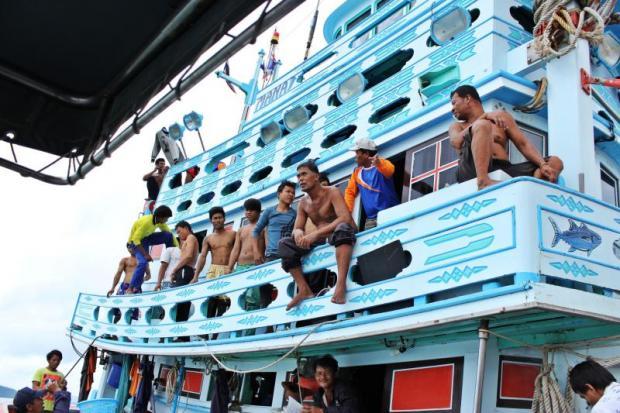Thailand: Business hails labour law delay
Business leaders on Tuesday hailed the government’s decision to invoke the powerful Section 44 of the interim charter to delay enforcement of the new controversial labour regulation law for 180 days, saying the grace period is enough for local businesses to comply with the act. On Monday Big Business praised the government for bringing in new labour laws.
Six months is enough for the private sector to ready themselves and comply with the new labour management law, said Predee Daochai, chairman of the meeting of the Joint Standing Committee on Commerce, Industry and Banking.
“We strongly believe the new law will benefit the country, both employers and workers, in raising labour recruitment and management standards, said Mr Predee, who is also chairman of the Thai Bankers Association. “It will also assuage accusations from the international community regarding abuse and human trafficking. But we appreciate the way the government has taken swift action per our request and delayed enforcement of the new, tighter labour act for 180 days. Preparation by the private sector from here on out will depend on the management efficiency of each employer.”
Kalin Sarasin, chairman of the Thai Chamber of Commerce, said migrant workers are mainly employed in Thailand’s agriculture industry, small and medium-sized enterprises and service sector. Those industries will bear the brunt of the new act, and should therefore rev up efforts to cope with the new law during the grace period.
Yongyuth Chalamwong, the research director of the Thailand Development Research Institute (TDRI), said that although business operators will be gravely affected by the smaller labour force, they will be able to adapt during the adjustment period.
The Institute estimates up to 300,000 illegal foreign workers will be deported as a result of the revised labour law.
Nonetheless, the workforce is expected to bounce back to its full potential in four to six months.
Thailand has already signed a memorandum of understanding with the governments of Myanmar, Laos and Cambodia, and is currently in the process of recruiting Vietnam as the fourth country. This agreement will facilitate the hiring process of foreign workers, he said.
“Nonetheless, strict implementation of the new labour law will eliminate problems such as unfair labour practices, the spreading of deadly diseases and drug use among workers,” he said.
In a separate development, the International Labour Organisation (ILO) said in a statement filed Tuesday that it had urged more dialogue in addressing migrant labour issues.
“A series of changes to migrant worker policy in a short period of time has shown the potential for creating difficulties for workers and industry as they face challenges in internalising new rules. These challenges have direct implications on planning for businesses and ensuring labour protection for migrant workers. The most recent developments confirm that consultations with stakeholders and social dialogue are of critical importance,” it said. “The ILO reiterates the importance for policymakers of engaging in regular tripartite dialogue, and the need to develop evidence-based policy and implementation.”
The ILO said the planned “grace period” announced by the Thai government provided opportunities for both employers and workers to work out solutions regarding their specific interests based on tripartite dialogue.
“Transition from one policy regime to another requires direct engagement and dialogue with workers and employers through consultative mechanisms as well as early and well-targeted information campaigns,” it said.
On June 22, 2017 the Royal Ordinance, titled the Management of Employment of Migrant Workers, was published in the Royal Gazette and came into effect on 23 June 2017.
The enactment of the law outlines a number of well-developed provisions relating to recruitment practices such as a zero-fee regime for migrant workers.
In addition, the migrant repatriation fund was replaced by the Management of Employment of Migrant Workers’ Fund, which has a broader application and does not impose fees on workers.
Despite these key developments, the law does enact some provisions that can infringe on the rights of migrant workers, for instance, the power to limit the freedom of movement through a zoning provision. Also, the law imposes tough penalties for employers who hire an irregular migrant worker and retains previous financial and criminal penalties for workers which may be excessive.
“The International Labour Organization is closely monitoring the situation and calls for consultation and dialogue with key stakeholders including employers and workers organisations. While the ILO welcomes well-developed provisions which are in line with the international labour standards, it also recommends that the Royal Thai Government undertake an impact analysis of the law, review zoning requirements and reconsider the extent of penalties imposed on employers and workers,” the ILO said.
The organisation said it would continue to encourage the Thai government and its social partners to jointly work on improving the legal framework on the basis of relevant international standards.
“The government’s commitment to adding legal protections against forced labour found in the ILO’s Forced Labour Protocol and new capacity for labour inspection services will be important tests of the durability of changes introduced over the last two years,” the ILO said. “Organising and bargaining rights for workers found in core ILO Conventions such as Conventions No.87 and No.98 are also an integral and critical part of the solution.”
Source: http://www.bangkokpost.com/business/news/1281115/business-hails-labour-law-delay


 English
English




